About how I bought a new car! And struggling to decide what to do with my museum piece… Also catching up on finishing A ROSE IN THE MIRROR, getting bills paid, and being impatient with recovery from illness.

RITA ® Award-Winning Author of Fantasy Romance
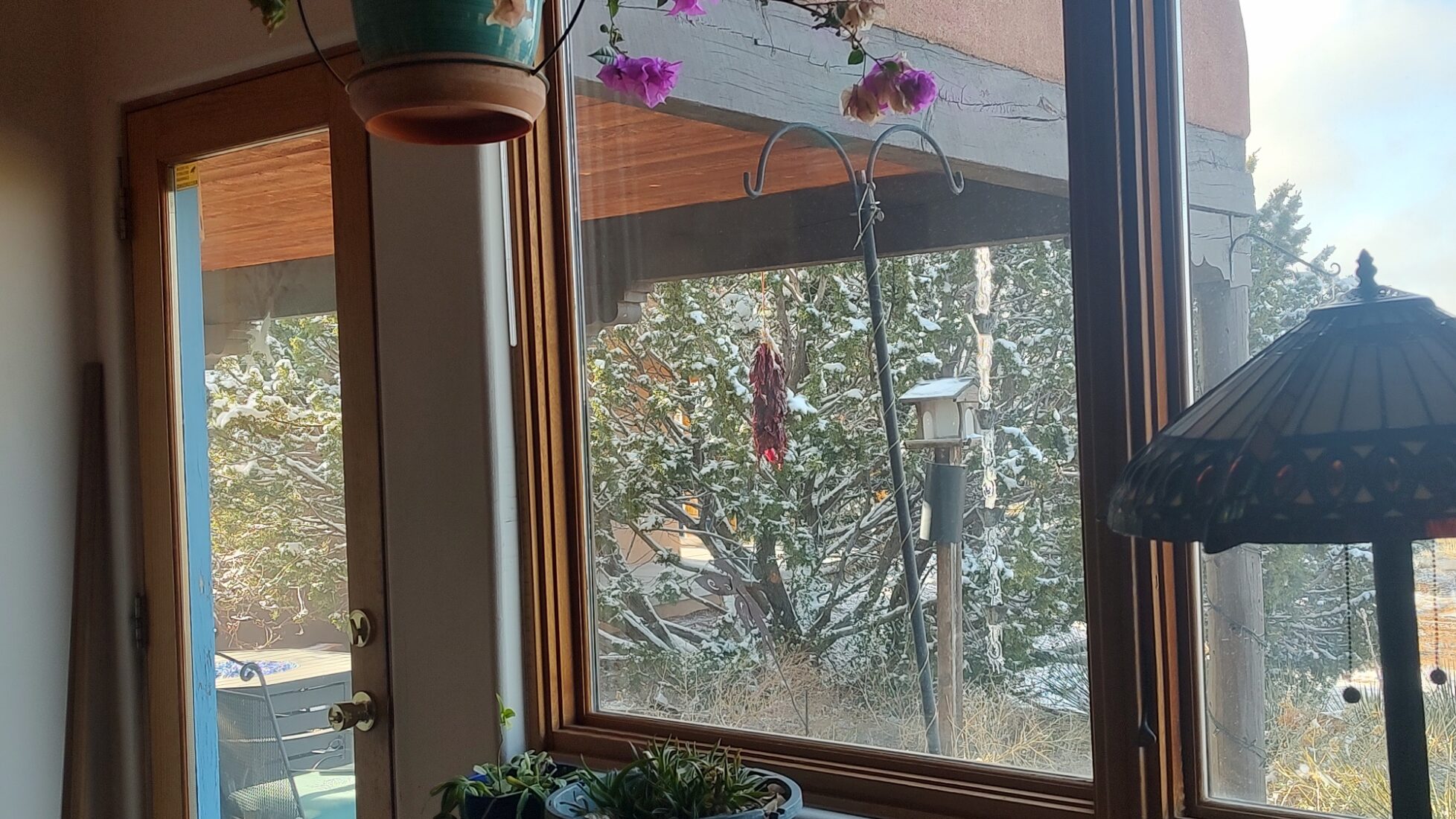
About how I bought a new car! And struggling to decide what to do with my museum piece… Also catching up on finishing A ROSE IN THE MIRROR, getting bills paid, and being impatient with recovery from illness.



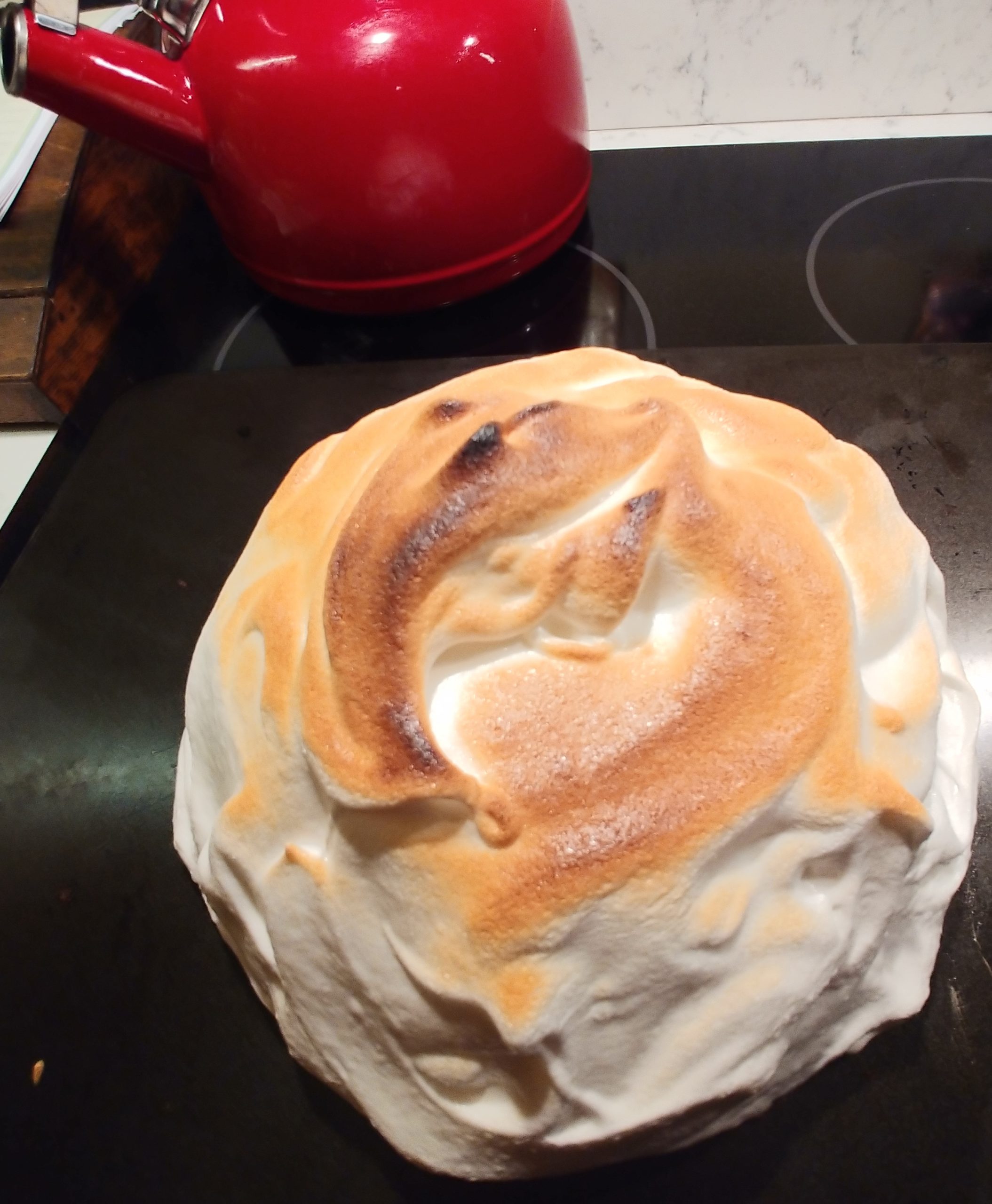

The pattern of frost-filigreed wisteria vines is so lovely. The winter holidays are such a great season for rest and rejuvenation – and our weather in the high desert of New Mexico has obliged with lots of snow and freezing temperatures. All the better to keep me cozied indoors and focusing on both relaxing and giving my mind the room to mull thoughts for the coming year. A big part of that is going to be reducing back log and lists. Come on over for more.
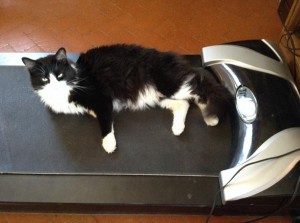 I’m over at Word Whores talking about recovery time, what happens when your writing schedule goes to hell and how to get back on track!
I’m over at Word Whores talking about recovery time, what happens when your writing schedule goes to hell and how to get back on track!
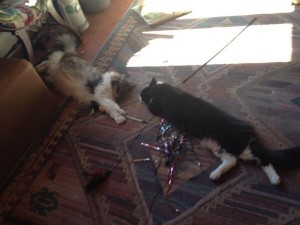 I emerged from my office yesterday to happen upon this scene. Both cats were passed out, nearly nose-to-nose, amidst the detritus of cat toys. As one Facebook commenter pointed out, they look like they partied hard all night.
I emerged from my office yesterday to happen upon this scene. Both cats were passed out, nearly nose-to-nose, amidst the detritus of cat toys. As one Facebook commenter pointed out, they look like they partied hard all night.
Cats are admirable for their ability to relax. They can go from 60 to 0 in a blink. Wild rocket-cat to full-out, belly-up sprawl. There’s fascinating biology and animal behavior theories around this. Because felines are the most efficient predators out there, they have a lot of down time. They basically snooze so much because they can.
Wouldn’t that be nice, if we could be so super-productive with our time that we could spend the rest of it goofing off?
That’s part of the thrust of this fascinating article from Scientific American about why our brains physiologically require downtime. This bit, in particular, stood out for me:
Based on his own work and a thorough review of the relevant research, Ericsson has concluded that most people can engage in deliberate practice—which means pushing oneself beyond current limits—for only an hour without rest; that extremely talented people in many different disciplines—music, sports, writing—rarely practice more than four hours each day on average; and that many experts prefer to begin training early in the morning when mental and physical energy is readily available.
I also liked this:
Many recent studies have corroborated the idea that our mental resources are continuously depleted throughout the day and that various kinds of rest and downtime can both replenish those reserves and increase their volume.
and
By adulthood, most of us have adopted the habit of sleeping through the night and staying awake for most or all of the day—but this may not be ideal for our mental health and is certainly not the only way people have slept throughout history. In somewhat the same way that hobbits in Tolkien’s Middle Earth enjoy a first and second breakfast, people living without electricity in preindustrial Europe looked forward to a first and second sleep divided by about an hour of crepuscular activity. During that hour, they would pray, relieve themselves, smoke tobacco, have sex and even visit neighbors. Some researchers have proposed that people are also physiologically inclined to snooze during a 2 P.M. to 4 P.M. “nap zone”—or what some might call the afternoon slump—because the brain prefers to toggle between sleep and wake more than once a day. As far back as the first century B.C. the Romans regularly took midafternoon breaks, which they called meridiari from the Latin for midday. Under the influence of Roman Catholicism, noon became known as sexta (the sixth hour, according to their clocks), a time for rest and prayer. Eventually sexta morphed into siesta.
See, I tend to be the kind of person who works non-stop. I’m not much of a napper. I’ve always been blessed with good concentration – which is a handy skill for a novelist – but it means I can work for hours on end without noticing the passage of time. I’ll emerge from the trance utterly exhausted. And yes – it’s almost never more than four hours.
I rarely take this exhaustion seriously because, after all, I was only writing. Just thinking and keyboarding. It’s not like I was working four hours digging ditches.
But what all this research implies is that, energetically, it is the same.
So I love this concept of introducing deliberate mental downtime in my days. I think it’s so true that, as Americans, we get into this mode of working All The Time. For my day job, I work for a consulting firm much like the one cited in the article. During the recently ended government shutdown, we could not work on our projects – because our work is almost entirely for the EPA, which was deemed non-essential. I took leave and spent time on writing (of course), but it was fascinating to see so many of my colleagues not know what to do with themselves. I know of two gals who took vacation leave and went to work in the soup kitchen, just to feel productive. That’s great that they wanted to do it, but my first thought was, take vacation leave and go rest.
A lot of people in my company don’t use their vacation leave – and they’re proud to say so.
Thus, I’m working on freeing up my work habits and introducing deliberate rest time. It turns out that even closing my eyes for a few minutes should restore my mind. I also need to walk away from the computer more often – mini-breaks to switch up those energy-draining activities.
Oh and hey – it’s almost the weekend! Let’s all go do some restorative activities!
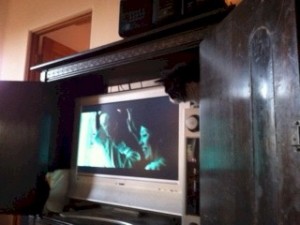 Jackson has figured out how to get up inside the TV cabinet. He’s still not sure why we stare at that screen, however.
Jackson has figured out how to get up inside the TV cabinet. He’s still not sure why we stare at that screen, however.
So, the Good News? I finished the book!!!!
(Cue screams of joy from fans and various expressions of relief and eyerolling from family and friends.)
The Bad News?
Wow, am I tired!
Not really physically tired, just emptied out. It’s really amazing, this writing-a-novel thing – it really does feel like running a marathon. (Or so I presume, not being the kind of gal who has EVER run a marathon.) Even working at a measured and even pace, by the end it feels like I’m creating an enormous soap bubble. Every day I add a bit more air, expanding it, steadying it, letting it grow larger and larger. And in the final days, I detach it from my wand and it floats away, leaving me hollow.
It’s a peculiar feeling. It’s like I have no thoughts at all.
If I could – and maybe one day when I get organized about this writer gig, I will – I’d plan for a week-long vacation post-deadline. I’d love to just go hang by a pool somewhere, order drinks from cabana boys and let myself gradually refill.
At any rate, that’s all I’ve got in me for a blog post today. I looked at my long list of very interesting potential topics and my writing brain did that thing like when your car battery is nearly dead. It kind of started to turn over, sputtered and went quiet.
Somebody send cabana boys. Stat.